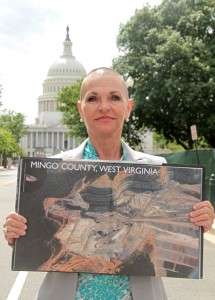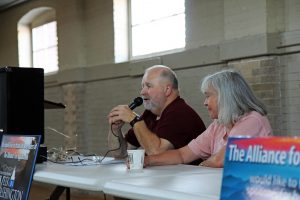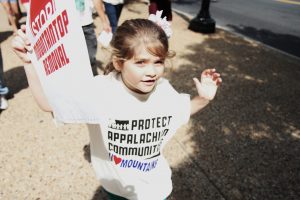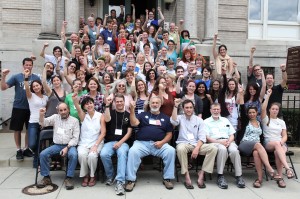
Donna Branham recently joined other Appalachian women in West Virginia in shaving her head in an act of mourning and protest against the destruction of the mountains. (Photo by Jamie Goodman)
![]()
By Jessica Kennedy
Editorial assistant, Summer 2012
I’ve never seen mountaintop removal. I’ve seen it in pictures, books, movies. I’ve seen it in dreams and reconstructed it in my head. I’ve pictured its destruction settling in my mountains – the giant hills that make Boone the town it is. I am thankful mountaintop removal has not made its home in North Carolina.
One day, I hope I will see it up close so that I can begin to feel the magnitude of it. But after last week, I have seen so much more than stripped mountains. At The Alliance for Appalachia’s 7th annual End Mountaintop Removal Week In Washington, I met people whose lives have been altered, whose health has been damaged, whose homes have been destroyed – all because of mountaintop removal. Seeing the damage to these innocent people was perhaps more powerful than seeing the stripped remains of the mountains themselves.
One Appalachian resident said witnessing mountaintop removal is like seeing someone you love die.
The heartbreak and heartache caused by mountaintop removal came together in a powerful way last week – more than 130 people went to 125 lobby visits with congressmen and senators from states across the country. Four new co-sponsors signed on to the Clean Water Protection Act after the lobbying effort.
As a journalism student and a summer intern with Appalachian Voices, lobbying was completely new to me. I had never walked through the halls of the House office buildings, and I had certainly never stepped into a D.C. office of an elected representative. There is a different atmosphere in the nation’s capital, especially stepping into the vast stone buildings where our representatives work from day to day; I felt like a foreigner thrown into the suits and briefcases running through the hallways.
But walking through the building, I found solace in remembering that I am a constituent. I am a citizen, a resident. I am a voter. And each of these realizations reminded me that I was welcome. Representatives represent – I was justified in presenting my voice amid the chatter.
And to say the least, lobbying was empowering. Terrifying – especially when I unexpectedly braved one lobby visit on my own – but also exciting. Most of the representatives I visited were from areas not directly affected by mountaintop removal. Some were easier to convince than others, while some were hesitant to support something that doesn’t impact their constituents.
But ending mountaintop removal is not a one-man, or even a one-state, fight. The message of the week, spoken when all of us were gathered in the headquarters eating breakfast, was “you are not alone.” Accomplishing massive things is intimidating when one person carries it all, but when the goal is spread among hundreds, the impossible becomes more manageable. The consequences of mountaintop removal are not confined to state lines, and working for change shouldn’t be confined to these borders either.
After concluding the lobby visits, we held a rally at Upper Senate Park as part of our National Call-In Day. With the Capitol as a backdrop, several brave men and women shaved their heads in a display of mourning and protest of mountaintop removal coal mining. As thick locks of hair fell to the ground, others at the rally sang songs of hope. At the same time, four peaceful sit-ins were staged in the offices of four representatives by various groups from Kentucky, Virginia, West Virginia and Tennessee, the states in which mountaintop removal occurs.
It’s easy to get caught up in the tragedy of mountaintop removal, but remaining hopeful is essential. We move forward because we believe things will change, because we have hope that things will get better. Behind the protest signs and banners are people who have hope, people who want a better world for their children and their children’s children, and people who want to preserve the world for future generations that they will never meet.

Stanley Sturgill, a resident of Kentucky, speaks about his experience with mountaintop removal during the Week In Washington training day. (Photo by Jessica Kennedy)

Week In Washington participants walk to one of the House office buildings. (Photo by Jessica Kennedy)

Week In Washington participants stand on the steps of a House office building to sing and chant before the rally. (Photo by Jessica Kennedy)







You’ve never seen it, but you feel obligated to destroy the industry that feeds our families, and lights our homes ? Without mountain top removal we’d have no place to build our business’, schools, expo centers etc. Everywhere else in the country what we do is called development… Here it’s called destruction !!!! You have no idea what your doing to an already poor part of the united states. With this EPA crap shutting down our mines, were soon going to have to choose between buying food or having lights. SO.. as you compare mountain top removal to seeing someone die in a symbolic manner…. We’ll be living that very death in reality. With no health care, money, or food, due to our loss of employment.. Death will be a very REAL premature issue.
I’m 50/50 on whether “James” is really an average Joe from a mining town or just an Energy Lobby PR Intern who gets paid to troll message boards.
But assuming you are real James… With all due respect, this industry is ALREADY destroying your families and homes in the form of double cancer rates, birth defects, and ruined drinking water. The “EPA crap” is just the icing on the cake.
And with such exploitation going on, it seems wacky to be lamenting the loss of health care and a pay check. It’d be like a slave lamenting emancipation after the civil war. “The slave owners/mining interests ruin our health, family, and lives. But they also feed us/give us health care. So we’d rather be slaves/keep mining away.”
A few slaves probably felt this way, but I’m pretty sure the vast majority were glad to be free.
And just for the record, coal mining isn’t “development.” It’s an obsolete technology that exacts a horrible environmental and human toll.
Keep fighting the good fight Appalachian Voices. It’s nice to know you guys are fighting hard even if your work isn’t fully appreciated by everyone!
James,
Thanks for taking the time to comment and share your thoughts and fears. You’re welcome here any time.
Most of us either grown up around these sites or spent a great deal of time with folks and communities that are directly impacted. We ALL love our mountains and mountain communities because we are or have been a part of them. This has led us to a couple of conclusions, which we’d be happy to talk about more specifically and work together with you on solving.
1. The way we are mining coal is making people sick. Twenty-one peer reviewed studies back up this conclusion.
2. Reclamation and restoration is an important part of the job of the coal mining, but it very very rarely turns into economic development. Its hard to build a large building on such unstable soil without foundational problems (see Big Sandy Penitentiary).
3. EPA’s attempt to protect public water in Appalachia may result in some mines not being opened, sure. But in the big picture the increasing cost of and decreasing demand for Central Appalachian coal is what is driving production downward. Its the free market, not the EPA, that will continue to force production downward.
4. Despite this fact, Appalachian mining jobs are at their highest level in 15 years BECAUSE we are doing less mountaintop removal and more underground mining. 60 years ago there were more than 130,000 mining jobs in WV alone, now there are around 30,000, due mostly to the switch from underground mining to surface mining. In Tennessee, we’ve lost 85% of our mining jobs since 1985 for largely the same reason. Where was the coal industry’s political outcry during the real jobs crisis created by a switch to surface mining?
The political power of the coal industry has long outlived their ability to provide sustainable job growth and broad-based economic benefit to Appalachian communities. More mountaintop removal certainly isn’t the answer. Appalachian Voices believes that we need to move away from destructive forms of mining such as mountaintop removal and towards a more diverse economy and energy portfolio, which is why we work on implementing things like energy efficiency programs.
Have a good day.
peace,
JW
I grew up in mtntop removal WV.
I see the destruction of the mtns., clean water, healthy lifestyle.
I see my miners’ fears of losing their jobs, homes, families.
I see the conflict between 2 groups of people-both wanting what they believe is necessary and best to survive.
I see politicians and big business exploiting both.
Jim, you don’t have a clue. And I can assure you I’m real. Thats what you dont seem to understand. There are real people suffering because of people like you running off at the mouth at some bull shit study you’ve read. Peer Studies ????? Are you serious ? Theres no more of us sick here than anywhere else ???? I do know there is problems with mining like any other industry, but the studies that are backing your sides argument make everyone of us that live and work here laugh out loud. Exactly what do any of you know about it ? you’ve never seen it ? And for the record, ALMOST EVERY shopping center, factory, hospital, youth center, school, wal-mart, sub-division etc IS BUILT ON RECLAIMED STRIP MINES !!!! Those comments right there just shows how little you know about the subject. I invite you to come to eastern kentucky, let me know when you do, and you can see first hand what all types of mining mean to us. Don’t go to D.C to find out about us.
James,
I appreciate your comment, and I do think it’s important to hear all sides of a story. Although I, personally, have never seen mountaintop removal, most of my co-workers and members of The Alliance for Appalachia have seen it, and many of them have also lived near it or been directly affected by it. I try to understand mountaintop removal and the issues surrounding it as well as I can while not living in it, and hearing the stories of the people whose lives have been torn apart by this mining process has led me to want to help them. I want their voices to be heard. But there are many sides to all stories, and I appreciate your input. I will make sure to take your views into consideration as I continue my work here at Appalachian Voices.
Jessica
James,
As someone who lives in eastern Kentucky as well, let me assure you I am not laughing. You ask us what do we know about it? Well, for the past year, my family and I have been living under the threat of a mudslide that did not exist until the coal company mining the opposite side of the mountain began blasting in summer 2010. The mine is a very large surface mine, and the opposite side of our mountain is pretty much gone. It’s just rubble and exposed rock that looks like a massive quarry from a distance. The mountain has also been drilled at least five times on and around it for natural gas. Most of those wells are active and are probably the only reason the mountaintop is still there.
Despite the immense damage to the mountain, the state will put zero blame on the coal company for our mudslide. Instead, they’ve termed it an “act of God,” and said we can expect no help from them or the coal company. With insurance also refusing to cover landslide damage, we will lose everything in the near future. There is nothing we can do to stop it. And though they knew about the mudslide, the coal company blasted again last summer…
The mining site itself will never be developed. It’s in the head of a holler, accessed by a one-lane, partially-paved road. It’s cut off on one side by a river, and the nearest town is a census-designated place (a fancy way of saying “blink and you miss it,”) with a post office and a church. It’s a destroyed mountain, and that’s all it’ll ever be.
Since the mudslide was discovered (it comes down little by little with each thunderstorm, and that is only because we’ve been immensely lucky,) we’ve also noticed the hills around us are getting steeper over the course of months. Our modest home is no longer level, our porch fell and an old, abandoned mine entrance has begun spewing orange acid water. We’re probably lucky that we no longer have well water, or matters would likely be a lot worse.
It’s not the only mudslide in the holler, either. There’s another up the road that threatens my distant relations (and yes, mining is occurring behind them as well,) and there’s been talk of MTR on a mountain in the head of the holler, too. If it happens, the only home my family has known for the past 100 years will have to be vacated. Our old home place, our family’s cemetery and everything that has been special and had a history to us will be gone for good and our family scattered to the winds.
My question is, would you not be upset about this if it were you and your family? Everything you’ve worked for gone – no one is going to reimburse you, insure you and you can’t sell because no one in their right mind would buy the place. You will have to start over with nothing (providing you can get out of there safely when things all go to hell,) and hope and pray that the same thing doesn’t happen again. Because it can. Would you not want to fight back? That’s all we’re doing. Like you, we’re fighting for our right to survive…
That said, I do understand your side. Coal mining is a part of my family’s history, and I know how scary it can be to think about the loss of a job. My grandfather was injured in the mines and was turned out with nothing. He was an older man with little education and a family to feed in an area where the only jobs were in the one thing he could no longer do. He turned to moonshining, and eventually died in prison of black lung disease. It’s a cruel reality that happens so many times here. Too many times, to be honest.
The truth is, we ALL deserve better than what we’ve got – you, me, our families and everyone in the region. We deserve to have a future, and the more I read what you and others say, the more I realize that we’re not so different. We’re all scared, and we’re all fighting for the same thing – our survival and the future of Appalachia. We just have different methods of going about it. That doesn’t mean we can’t be on the same side.
However, blasting the tops off the mountaintops is not going to make things alright. It’s just going to hasten the end. It takes less workers to work a surface mine because men have been replaced with explosives and machines – less workers equals less pay and less benefits to provide. The only one who is really profiting is the coal industry, and it doesn’t take a peer-review study to figure out what’s going on. Moreover, our supplies of coal are limited and they’re dwindling with each three-mile long coal train that exits here daily. Our economy is coal-based, and right now, the demand is just not there. Other types of fuel, such as natural gas, are cheaper and growing in popularity. Times are changing and we need a diversified economy if we are to survive. If we continue to latch on solely to coal, sooner or later, it will be the end of us environmentally, economically, socially and culturally.